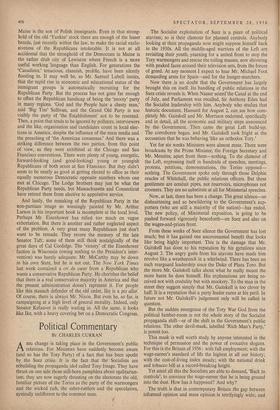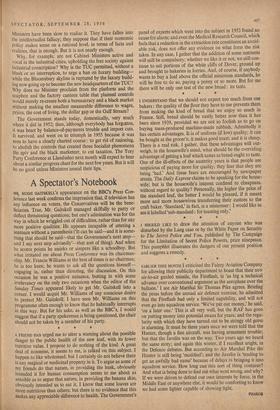Political Commentary
BY CHARLES CURRAN ABIG change is taking place in the Government's public relations. For Ministers have suddenly become aware (and so has the Tory Party) of a fact that has been spotlit by the Suez crisis. It is the fact that the Socialists are rebuilding the propaganda ,idol called Tory Image. They have thrust on one side those still-born pamphlets about egalitarian- ism; they are now eagerly thrusting on the electorate the old, familiar picture of the Tories as the party of the warmongers and the wicked rich, the sabre-rattlers and the speculators, cynically indifferent to the common man. The Socialist exploitation of Suez is a piece of political atavism; so is their clamour for planned controls. Anybody looking at their propaganda now might suppose himself back in the 1930s. All the middle-aged warriors of the Left are revisiting their youth, yearning for a united front to stop the Tory warmongers and rescue the toiling masses, now shivering with peaked faces around their television sets, from the forces of greed. At any moment I expect to hear Mr. Michael Foot demanding arms for Spain—and for the hunger-marchers.
Now there is no doubt that the Government has largely brought this on itself. Its handling of public relations in the Suez crisis reveals it. When Nasser seized the Canal at the end of July, and Parliament was recalled, Sir Anthony Eden had the Socialist leadership with him. Anybody who studies that historic document, Hansard for August 2, can see how com- pletely Mr. Gaitskell and Mr. Morrison endorsed, specifically and in detail, all the economic and military steps announced by the Government. Then came the great Left build-up. The corroboree began, and Mr. Gaitskell took fright at the accusation that he was behaving 'like an orthodox Tory.'
Yet for six weeks Ministers were almost mute. There were broadcasts by the Prime Minister, the Foreign Secretary and Mr. Menzies; apart from them—nothing. To the clamour of the Left, expressing itself in hundreds of speeches, meetings, protests, petitions, demonstrations, the Tories opposed— nothing. The Government spoke only through those Delphic oracles of Whitehall, the public relations officers. But these gentlemen are conduit pipes, not reservoirs, microphones not crooners. They are no substitute at all for Ministerial speeches.
Now, at last, there has been a change. The great silence—so disheartening and so bewildering to the Government's sup- porters (who are still a majority of the nation)—has ended. The new policy, of Ministerial exposition, is going to be pushed forward vigorously henceforth—on Suez and also on the wages-and-prices front.
From these weeks of Suez silence the Government has lost much; but it has gained one uncovenanted benefit that looks like being highly important. This is the damage that Mr. Gaitskell has done to his reputation by his gyrations since August 2. The angry gusts from his atavists have made him revolve like a weathercock in a whirlwind. There has been no such rearguard leadership since the Duke of Plaza Toro. But the more Mr. Gaitskell talks about what he really meant the more harm he does himself. His explanations are being re- ceived not with credulity but with mockery. To the man in the street they suggest simply that Mr. Gaitskell is too clever by half. It is a reputation that a party leader earns at his peril. In future not Mr. Gaitskell's judgement only will be called in question.
But the sudden emergence of the Tory War God from the political lumber-room is not the whole story of the Socialist propaganda shift—or of the shift in the Government's public relations. The other devil-mask, labelled 'Rich Man's Party,' is potent too.
This mask is well worth study by anyone interested in the technique of persuasion and the power of evocative slogans. For this is the Britain of 1956: with full employment; with the wage-earner's standard of life the highest in all our history; with the cost-of-living index steady; with the national drink and tobacco bill at a record-breaking height.
Yet amid all this the Socialists are able to demand, 'Back to controls'; to convince the wage-earner that he is being ground into the dust. How has it happened? And why?
The truth is that in contemporary Britain the gap between informed opinion and mass opinion is terrifyingly wide; and Ministers have been slow to realise it. They have fallen into the intellectualist fallacy; they suppose that if their economic policy makes sense on a rational level, in terms of facts and realities, that is enough. But it is not nearly enough.
Why, for example, are not Cabinet Ministers active and vocal in the industrial cities, upholding the free society against industrial conscription? Why is the TUC permitted, without a blush or an interruption, to urge a ban on luxury building— while the Bloomsbury skyline is ruptured by the luxury build- ing now going up to become the new headquarters of the TUC? Why does no Minister proclaim from the platform and the soapbox and the factory canteen table that planned controls would merely re-create both a bureaucracy and a black market without making the smallest measurable difference to wages, prices, the cost of living, the dollar gap or the Gulf Stream?
The Government stands today, domestically, very much where it did in 1952; then, 'although everybody has forgotten, it was beset by balance-of-payments trouble and import cuts. It survived, and went on to triumph in 1955 because it was seen to have a clearly charted course : to get rid of rationing, to abolish the controls that created those Socialist phenomena the spiv and the black marketeer, to cut taxation. The Tory Party Conference at Llandudno next month will expect to hear about a similar progress chart for the next few years. But it will be no good unless Ministers unseal their lips.



































 Previous page
Previous page